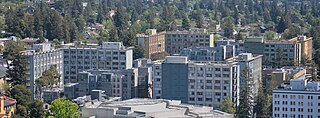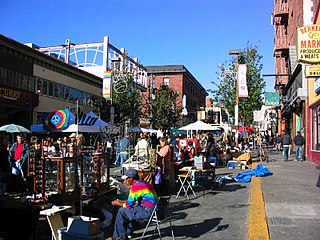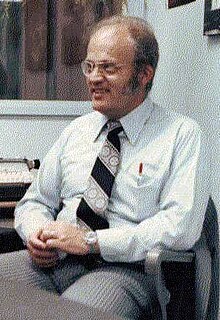
Berkeley is a city on the eastern shore of San Francisco Bay in northern Alameda County, California, United States. It is named after the 18th-century Irish bishop and philosopher George Berkeley. It borders the cities of Oakland and Emeryville to the south and the city of Albany and the unincorporated community of Kensington to the north. Its eastern border with Contra Costa County generally follows the ridge of the Berkeley Hills. The 2020 census recorded a population of 124,321.

The University of California, Berkeley is a public land-grant research university in Berkeley, California. Established in 1868 as the University of California, it is the state's first land-grant university and the first campus of the University of California system. Its fourteen colleges and schools offer over 350 degree programs and enroll some 31,800 undergraduate and 13,200 graduate students. Berkeley has consistently ranked among the world's top universities.

The California State University is a public university system in California. With 23 campuses and eight off-campus centers enrolling 485,550 students with 55,909 faculty and staff, CSU is the largest four-year public university system in the United States. It is one of three public higher education systems in the state, with the other two being the University of California system and the California Community Colleges. The CSU System is incorporated as The Trustees of the California State University. The California State University system headquarters are in Long Beach, California.

Sproul Plaza is one center of student activity at the University of California, Berkeley. It is divided into two sections: Upper Sproul and Lower Sproul. They are vertically separated by twelve feet (3.7 m) and linked by a set of stairs.

People's Park in Berkeley, California is located just east of Telegraph Avenue, bounded by Haste and Bowditch Streets, and Dwight Way, near the University of California, Berkeley. The park was created during the radical political activism of the late 1960s.

The University of California Marching Band, usually shortened to Cal Band, is the marching band for the University of California, Berkeley. While it is administered under the auspices of the university, the Cal Band is student-run and represents Cal at sporting events and social gatherings. The name of the band is "The University of California Band" by the constitution, but is typically called "The University of California Marching Band" or "The Cal Band". When the band marches out of Memorial Stadium's North Tunnel for football pre-games, it is referred to as "The Pacesetter of College Marching Bands, the Pride of California".

The Associated Students of the University of California (ASUC) is the autonomous and officially recognized students' association of the University of California, Berkeley. It is the only students' association within the University of California that is fully autonomous from the university administration. Founded in 1887, the ASUC is an independent, 501(c)(3) non-profit, and unincorporated association. The ASUC controls funding for all ASUC-sponsored organizations, advocates on behalf of students to solve issues on campus and in the community, engages with administrators to develop programming, increase student-organizational resources, and increase transparency.
The Berkeley Student Cooperative (BSC) is a student housing cooperative serving primarily UC Berkeley students, but open to any full-time post-secondary student. The BSC houses and/or feeds over 1,300 students in 17 houses and three apartment buildings. Food is provided to residents of the 17 houses, which also offer boarding meal plans to non-residents. As part of their rental agreement, residents of the houses are required to perform workshifts, typically five hours per week. The BSC is led by a board of directors which is primarily composed of and elected by student members.

Housing at the University of California, Berkeley includes student housing facilities run by the office of Residential and Student Service Programs (RSSP). Housing is also offered by off-campus entities such as fraternities and sororities and the Berkeley Student Cooperative (BSC).
The California Pelican was a college humor magazine founded in 1903 by Earle C. Anthony at the University of California, Berkeley. Lasting eighty years, it was the first successful student humor magazine in UC Berkeley, though it was preceded by Smiles in 1891 and Josh in 1895. It is succeeded by the Heuristic Squelch, which is still running.

Nicholas B. Dirks is an American academic and the former Chancellor of the University of California, Berkeley. Dirks is the author of numerous books on South Asian history and culture, primarily concerned with the impact of British colonial rule. In June 2020, Dirks was named president and CEO of The New York Academy of Sciences.
A student housing cooperative, also known as co-operative housing, is a housing cooperative for student members. Members live in alternative cooperative housing that they personally own and maintain. These houses are designed to lower housing costs while providing an educational and community environment for students to live and grow in. They are, in general, nonprofit, communal, and self-governing, with students pooling their monetary and personal resources to create a community style home. Many student housing cooperatives share operation and governing of the house. As with most cooperatives, student housing coops follow the Rochdale Principles and promote collaboration and community work done by the members for mutual benefit.

The Gourmet Ghetto is a colloquial name for the business district of the North Berkeley neighborhood in the city of Berkeley, California, known as the birthplace of California cuisine. Other developments that can be traced to this neighborhood include specialty coffee, the farm-to-table and local food movements, the rise to popularity in the U.S. of chocolate truffles and baguettes, the popularization of the premium restaurant designed around an open kitchen, and the California pizza made with local produce. After coalescing in the mid-1970s as a culinary destination, the neighborhood received its "Gourmet Ghetto" nickname in the late 1970s from comedian Darryl Henriques. Early, founding influences were Peet's Coffee, Chez Panisse and the Cheese Board Collective. Alice Medrich began her chain of Cocolat chocolate stores there.

Southside, also known by the older names South of Campus or South Campus, is a neighborhood in Berkeley, California. Southside is located directly south of and adjacent to the University of California, Berkeley campus. Because of the large student presence in the neighborhood, proximity to Sproul Plaza, and history of the area, Southside is the neighborhood most closely associated with the university.
SLATE, a pioneer organization of the New Left and precursor of the Free Speech Movement and formative counterculture era, was a campus political party at the University of California, Berkeley from 1958 to 1966.

The Oberlin Student Cooperative Association (OSCA) is a non-profit corporation that feeds and houses Oberlin College students. It is located in the town of Oberlin, Ohio, and is independent from but closely tied to Oberlin College, which has an enrollment of approximately 2900 students. OSCA is the second-largest student housing cooperative in North America, with the largest per-capita of any student co-op.

The University of California Jazz Ensembles, also known as the UC Jazz Ensembles, UC Jazz, or UCJE, is the student jazz organization founded in 1967 on the University of California, Berkeley, campus. Founded in 1967, it comprises one or more big bands, numerous jazz combos, a vocal jazz ensemble, an alumni big band, and instructional classes. With a mission statement to foster a community for the performance, study, and promotion of jazz at U.C. Berkeley, its Wednesday Night big band provides free concerts every Thursday noon on Lower Sproul Plaza, its various units perform throughout the San Francisco Bay Area including area high schools, travel to collegiate jazz festivals, and perform overseas, and for many years it sponsored the annual Pacific Coast Jazz Festival. It also provides master classes by its instructors and clinics by prominent guest artists. It has nurtured numerous musicians who have become professional jazz musicians and educators. UC Jazz Ensembles is one of three groups, with the Cal (marching) Band and UC Choral Ensembles, forming Student Musical Activities (SMA), a department within Cal Performances on the U.C. Berkeley campus. Its members are primarily U.C. Berkeley undergraduate and graduate students, representing many academic disciplines.

Jesse Arreguín is an American politician serving as mayor of Berkeley, California. He served on the Berkeley Housing Commission and Rent Stabilization Board from 2004 to 2009 and represented District 4 on the Berkeley City Council from 2009 to 2016. He is the first Latino elected Berkeley's mayor and one of the youngest mayors in the San Francisco Bay Area. Mayor Arreguin is the President of the Association of Bay Area Governments, the Bay Area's regional planning agency.
The Computer Science Undergraduate Association is an ASUC funded group at University of California, Berkeley, first founded in 1974. The CSUA's constitution reads:
The purposes of this organization are: to represent the undergraduate computer science student body in dealings with the University of California at Berkeley, its representatives, and any other appropriate organization; to provide a forum for the personal interaction of persons involved in the computer sciences; to promote knowledge of and interest in the computer sciences; and to raise funds to accomplish these goals.
Blockeley is a Minecraft server created by students of the University of California, Berkeley, which is a 1:1 scale reconstruction of the university campus.















